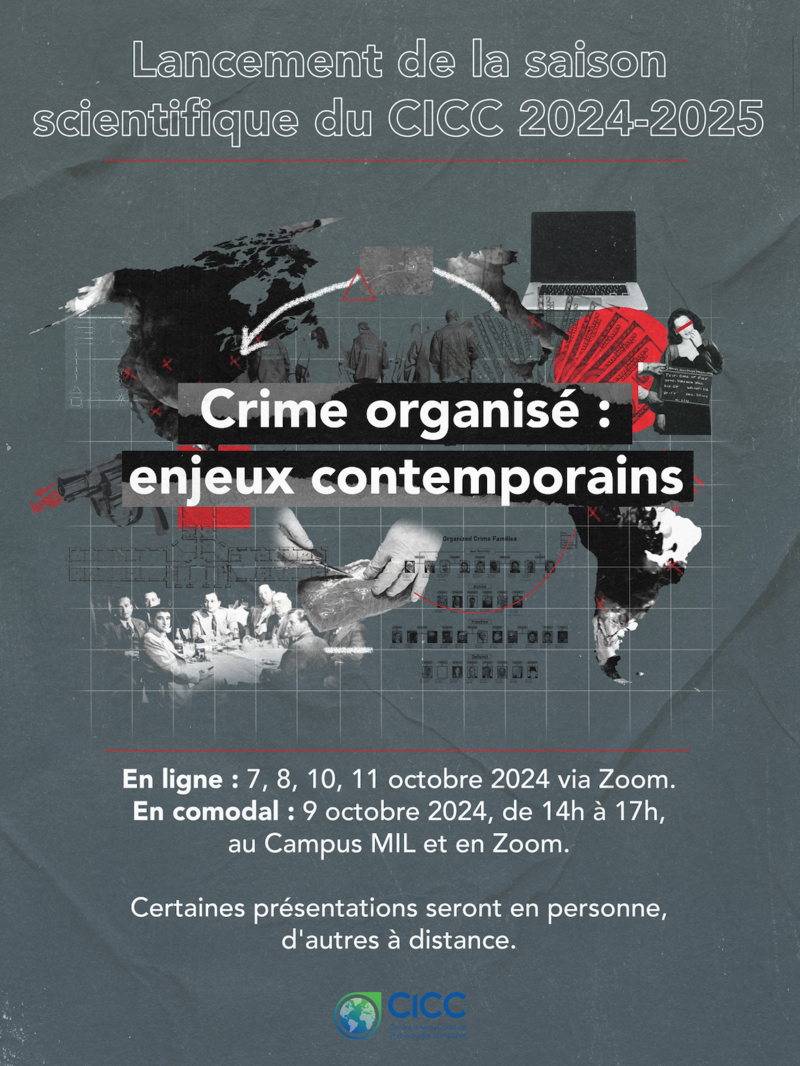
This event takes place over several days with sessions available online via Zoom and one day in person. The conferences and discussions will cover various themes related to organized crime, cybercrime, and the role of women in these contexts. A hybrid session will be held at the Université de Montréal on October 9, featuring presentations, an awards ceremony, and an in-person cocktail. Additionally, a scientific poster competition is organized for students supervised by a CICC researcher.
To register for the scientific poster competition to launch the CICC's scientific season, click here to fill in the form.
This free activity is an opportunity for students to present their research work and to exchange ideas with researchers and professionals in the field.
.
.
.
.
Schedule
|
Date/Time |
Conference |
|
Monday, October 7, 11:30 AM – 1:00 PM (Zoom) |
Familiness’ diversification: recognition, reputation and intergenerational changes in cross-border mafia-type families.- Professor Anna Sergi |
|
Tuesday, October 8, 12:00 PM – 1:30 PM (Zoom) |
Presentation of the book "Against Cybercrime: Toward a Realist Criminology of Computer Crime"- Dr Kevin F. Steinmetz |
|
Wednesday, October 9, 2:00 PM – 6:00 PM (In-person and via Zoom) |
Organised crime: Contemporary issues - Multiple speakers |
|
2:45 PM – 3:45 PM |
Professional Sports, Match Manipulations and Criminal Groups - Professor Stefano Caneppele |
|
3:45 PM – 4:45 PM |
The presence of Italian mafias in the world: types of mafias, activities and countries: 2000-2020 - Professor Francesco Calderoni |
|
4:45 PM – 5:45 PM |
Covering the Underworld - Simon Coutu, Journalist |
|
Thursday, October 10, 1:00 PM – 2:30 PM (Zoom) |
'Organised crime, women and power, completing the puzzle'. - Professor Felia Allum |
|
Friday, October 11, 2:30 PM – 4:00 PM (Zoom) |
The social order of the mob: how prison gangs govern the Californian penal system - Professor David Skarbek |
Please scroll down for additional information about the conferences.
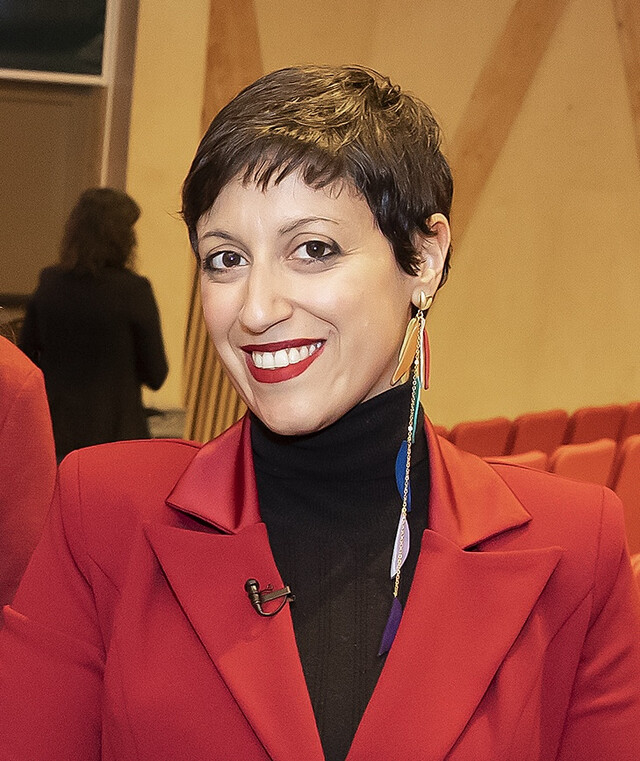
Anna Sergi is Professor of Criminology at the University of Essex. She researches mafia mobility and drug trafficking via seaports, but is also interested in topics such as corruption, power crimes, and ethnographies of organised crime. She has published extensively in renowned peer reviewed journals, and she has also authored 8 books. She is the recipient of the Early Career Award of the European Society of Criminology in 2023.
Summary:
Mafia-type families, envisioned as career criminal dynasties or family-based criminal organisations, are shaped by reputation within circles of recognition, both internal and external to the family. Mafia-type families or dynasties connected to the Calabrian ‘ndrangheta or of Italian origins have been successful at exploiting criminal opportunities across generations and places also thanks to their recognition and reputation, also abroad. Their familiness influences both their reputation and their business, as well as impacting on their diversification. In this article we explore how mafia-type families or dynasties experience familiness diversification, including intergenerational changes, transculturation and external factors, and how this relates to their recognition in the underworld, by other criminal groups as well as by law enforcement. Based on document analysis and interviews, and building on a new analytical framework, this paper present four ideal-types mafia-type families in Australia.
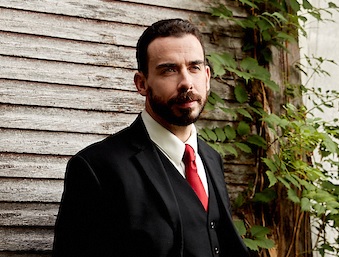
Dr. Kevin F. Steinmetz is a professor of criminology at Kansas State University and the current chair of the American Society of Criminology’s Division of Cybercrime. In addition to In addition to publishing multiple peer-reviewed articles on cybercrime, he has written or edited several books including Hacked: A Radical Approach to Hacker Culture and Crime (2016, NYU Press), Technocrime and Criminological Theory (2018, Routledge), Cybercrime & Society (2024, Sage), and Against Cybercrime: Toward a Realist Criminology of Computer Crime (2023, Routledge). In addition to his work in cybercrime, Dr. Steinmetz has also published on issues surrounding criminological theory, critical criminology, race and criminal justice, popular culture and crime, and others.
Summary: Details the theoretical contours of a "realist criminology of computer crimes," one grounded in American pragmatism and radical theory, tailored to the idiosyncrasies of the internet. Involved is a perspective oriented toward the achievement of social justice, democratic inclusion, and harm reduction. In short, a realist criminology of computer crimes considers a broad assortment of social harms, involves a nuanced and complex conceptualization of online space, traces the social relations of crime across many diffuse networks, and adopts an open and inclusive understanding of social stratification and oppression. It also adopts a reformist view of social change involving a commitment to short-term changes designed to build toward long-term objectives.
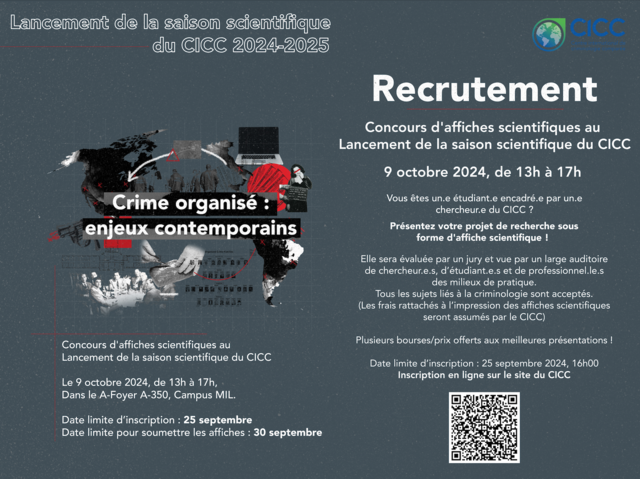
To register for the scientific poster competition to launch the CICC's scientific season, click here to fill in the form.
This free activity is an opportunity for students to present their research work and to exchange ideas with researchers and professionals in the field.
2:00 PM – 2:30 PM | WELCOME RECEPTION – SCIENTIFIC POSTERS (Université de Montréal, Campus MIL, A-Foyer A-350)
2:30 PM – 2:45 PM | WELCOME ADDRESS (in-person and online) (Université de Montréal, Campus MIL, Room A-3502.1)
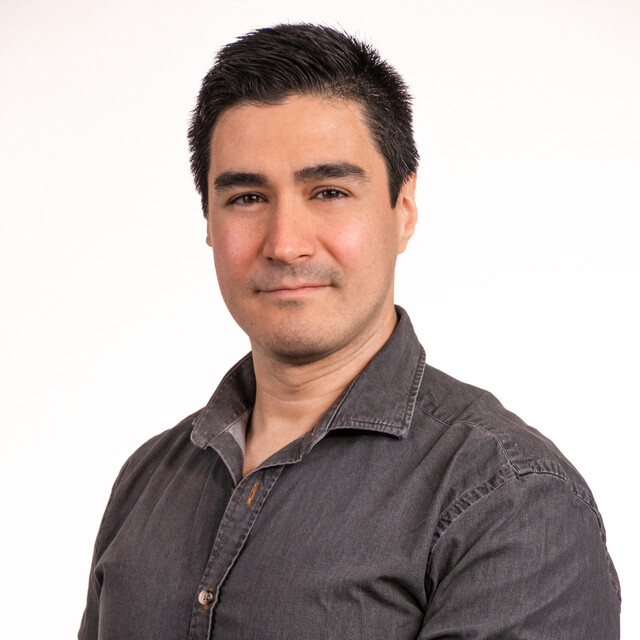
Valentin Pereda
Assistant Professor at the School of Criminology at the Université de Montréal, Valentin Pereda focuses on organized crime, Southern criminology, extralegal regulation, drug trafficking, and criminal violence.
2:45 PM – 3:45 PM | LECTURE (in-person and online) (Université de Montréal, Campus MIL, Room A-3502.1)
Professional Sports, Match Manipulations and Criminal Groups
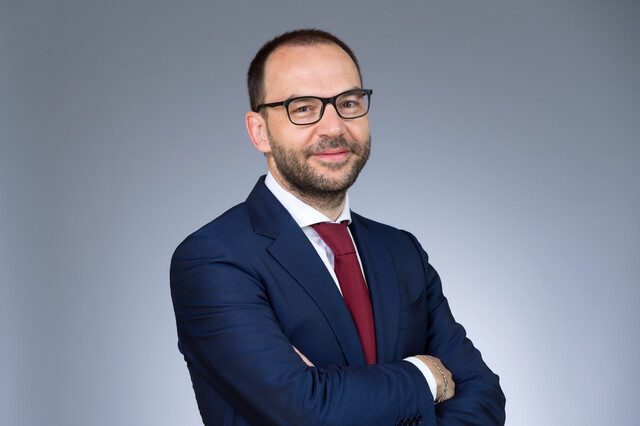
Stefano Caneppele
Full Professor of Criminology and Deputy Director at the School of Criminal Justice of the University of Lausanne. Previously, he was an Associate Professor at the Faculty of Political and Social Sciences at Università Cattolica del Sacro Cuore in Milan. He also worked at Transcrime on several international and national research projects (www.transcrime.it) from 2002 to 2015.
Currently, he chairs the Working Group ‘Responses to Illicit Trade’ in the COST Action CA21133 – Globalization, Illicit Trade, Sustainability, and Security (GLITSS). Additionally, he is the co-director of the Union of the European Football Associations (UEFA) Fight the Fix Programme, which equips professionals involved in combating match-fixing with the knowledge, tools, and skills needed to gather intelligence, lead investigations, and assist in prosecution proceedings. His main research interests include crime prevention, cybercrime, economic and organized crime, with a focus on sports corruption.
Summary :
Since the late 1990s, sports integrity has been increasingly undermined by numerous scandals. Beyond prominent doping incidents, match manipulation has emerged as a significant issue. According to the Council of Europe Macolin Convention, competition manipulation is defined as “an intentional arrangement, act or omission aimed at an improper alteration of the result or the course of a sports competition in order to remove all or part of the unpredictable nature of the sports competition with a view to obtaining an undue benefit for oneself or for others.”
Match manipulation affects various aspects of the sports industry. Criminal organizations, from small groups to mafias, infiltrate clubs and events to manipulate outcomes for betting fraud and money laundering. The rise of online sports betting has further expanded opportunities for match manipulation, providing a lucrative avenue for criminal activities, enabling economic gains and money laundering. These cases highlight the pervasive issue of match manipulation and its ties to white-collar and organized crime in professional sports, indicating a need for further research to understand the problem.
3:45 PM – 4:45 PM | LECTURE (in-person and online) (Université de Montréal, Campus MIL, Room A-3502.1)
The presence of Italian mafias in the world: types of mafias, activities and countries: 2000-2020
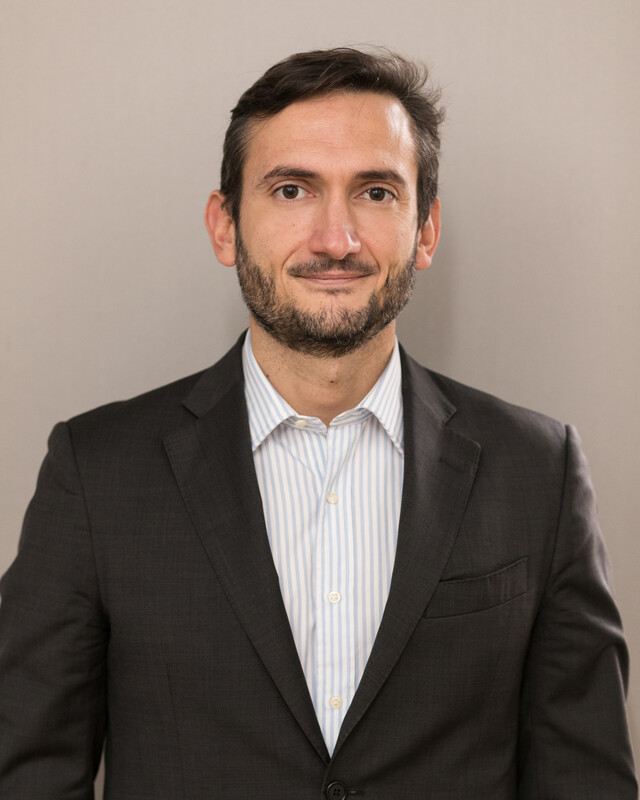
Francesco Calderoni is Full Professor of Criminology at the Faculty of Political and Social Sciences at Università Cattolica del Sacro Cuore in Milan. He is the coordinator of the M.Sc. in Crime and Security Analysis (CrimeSec) and the International Ph.D. in Criminology. He has been a researcher at Transcrime since September 2005, where he has participated in several international research projects as a coordinator. His primary areas of interest include organized crime, illegal markets, corruption, criminal and preventive policies against complex organized crime, and criminal network analysis.
Summary:
The image of Italian mafias is often stereotyped by the global society, portraying them as mythical and omnipresent figures of the shadow world. However, behind these cinematic representations lies a far more complex and influential reality. This presentation provides an in-depth analysis of the presence and activities of various Italian mafias worldwide, based on official reports from Italian anti-mafia authorities covering the period from 2000 to 2022. The findings reveal that certain countries, often advanced economies, are more frequently associated with specific types of mafias and criminal activities. Furthermore, the study explores temporal changes between the periods 2000-2011 and 2012-2022, highlighting the evolutions in the affected countries and the associated criminal activities. Finally, the presentation examines the geographical, socio-economic, political, and economic factors influencing the presence of Italian mafias abroad. By discussing the limitations of using official data, the study underscores the challenges and opportunities for future research on the mobility of criminal groups at a macro level.
4:45 PM – 5:45 PM | LECTURE (in-person and online) (Université de Montréal, Campus MIL, Room A-3502.1)
Covering the underworld
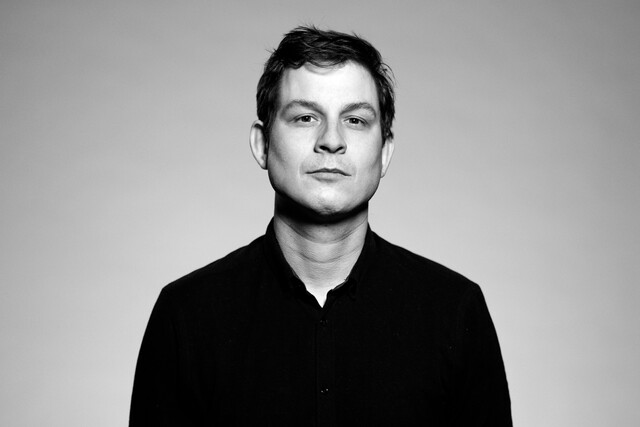
Simon Coutu is a journalist, filmmaker, and screenwriter. In recent years, he has worked for Radio-Canada and was involved in the launch of the VICE Quebec bureau, where he worked for five years. He advocates for an immersive, on-the-ground approach that gives a voice to those who rarely have one. He notably worked on L’Arme du crime, a television series on armed violence in Canada for Radio-Canada, where he regularly interacted with families of victims. Last year, he worked as a journalist on a series about Alexandre Cazes, the young man behind the largest darknet site who took his own life in Thailand. Documentaries focusing on human stories are particularly compelling to him. His reports and documentaries have garnered numerous accolades, including five Gémeaux awards and a Judith-Jasmin award.
Summary :
As a journalist, engaging with actors in the underworld presents a significant challenge. Testimonies are often given anonymously and may jeopardize the security and freedom of the participants. However, hearing these voices is crucial for obtaining a representative portrait of society. Independent journalist and documentarian Simon Coutu shares his experiences and some professional insights into interacting with criminals, who generally have little incentive to speak with the media. He also addresses and debunks certain myths that the public may hold about offenders.
5:45 PM – 6:00 PM | REMARKS AND AWARD PRESENTATION FOR SCIENTIFIC POSTERS (in person and online) (University of Montreal, MIL Campus, Room A-3502.1)
6:00 PM – 7:00 PM | RECEPTION (in person only) (University of Montreal, MIL Campus, A-Foyer A-350)
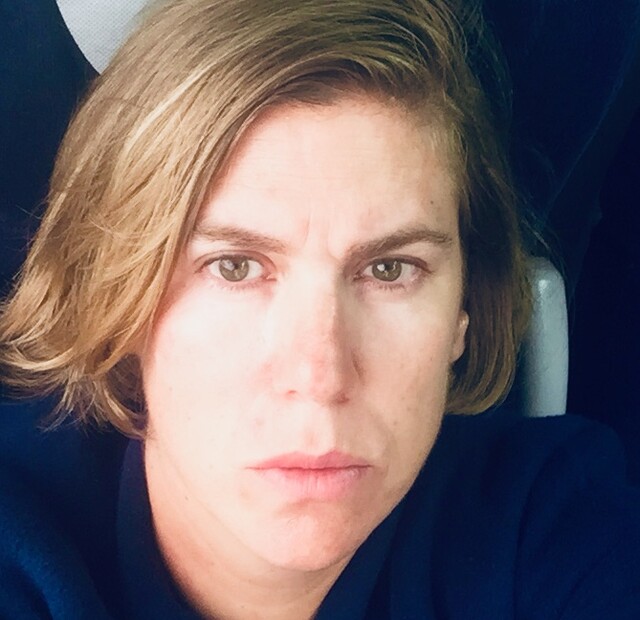
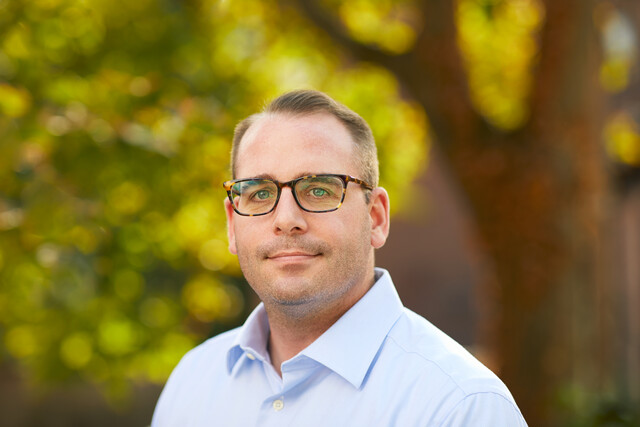
David Skarbek is the Michael Targoff Professor of Political Economy and the inaugural Director of the Center for Philosophy, Politics, and Economics at Brown University. His research examines how order emerges in illicit situations in which people cannot rely on strong and effective states. He has published extensively on the informal institutions that govern life in prisons in California and around the globe. His two books, both published by Oxford University Press, have won numerous awards, including the American Political Science Association’s William H. Riker Award for the best book in political economy and the Outstanding Book Award from the International Section of the American Society of Criminology. His work has been featured widely in national and international media outlets, such as the Atlantic, BBC, Business Insider, the Economist, Forbes, the Independent, and the Times.
Summary:
When many people think of prison gangs, they think of chaotic bands of violent, racist thugs. Few people think of gangs as sophisticated organizations (often with elaborate written constitutions) that regulate the social and economic life of the prison. Yet as David Skarbek argues, gangs form to create order among outlaws, producing alternative governance institutions to facilitate illegal activity. This book is a fascinating look into the seemingly irrational, truly astonishing, and often tragic world of life among the society of captives.
Attention - Votre version d'Internet Explorer est vieille de 20 ans et peut ne pas vous offrir une expérience optimale sur le site du CICC. Veuillez mettre à jour votre ordinateur pour une expérience optimale. Nous vous recommandons Firefox ou Chrome, ou encore ChromeFrame si vous êtes dans un environnement corporatif ou académique dans lequel vous ne pouvez pas mettre à jour Internet Explorer.